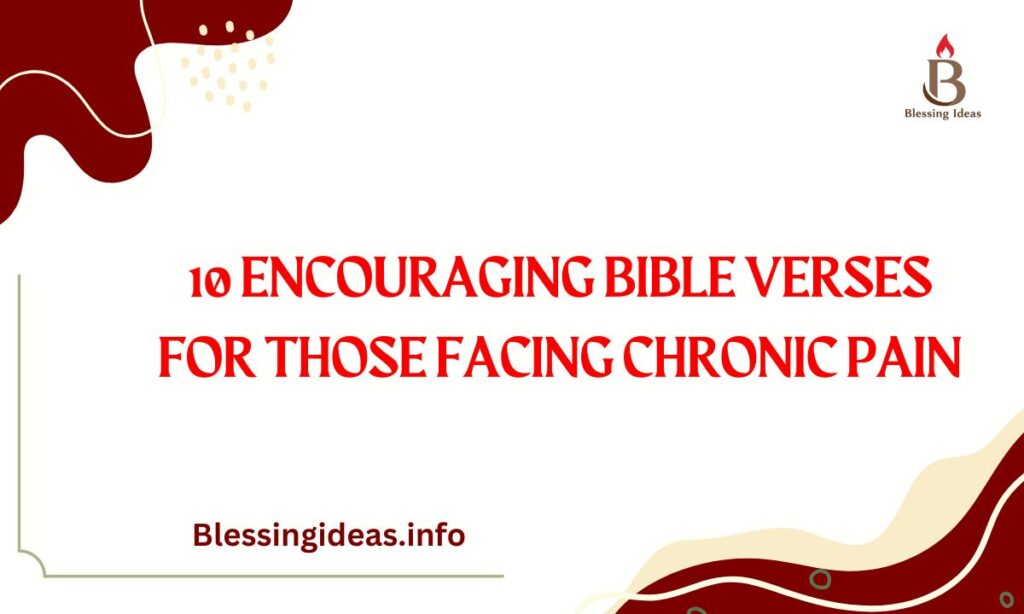Living with chronic pain presents one of life’s most challenging trials. The persistent ache, the sleepless nights, and the constant battle against discomfort can leave us feeling isolated, discouraged, and questioning God’s presence in our suffering. Many who walk this difficult path find themselves wrestling with deep spiritual questions: Where is God in my pain? Why does He allow this suffering to continue? Does He truly care about my daily struggles?
These questions are not signs of weak faith, but rather honest expressions of the human heart grappling with life’s hardest realities. Throughout Scripture, we find that God meets us in our pain, offering comfort, strength, and hope that transcends our circumstances. The Bible provides a treasury of verses that speak directly to those enduring chronic suffering, reminding us that we are not alone in our journey.
Comfort in God’s Presence
In the depths of chronic pain, feeling abandoned or forgotten by God is a common experience. The relentless nature of persistent suffering can make us question whether God truly sees our struggle or cares about our daily battles. However, Scripture repeatedly affirms that God is not distant from our pain but intimately present in our suffering.
Psalm 34:18 (ESV): “The Lord is near to the brokenhearted and saves the crushed in spirit.”
This profound verse from David’s psalm offers one of Scripture’s most comforting promises for those in pain. The Hebrew word for “near” suggests not just proximity but active involvement and compassionate attention. God doesn’t merely observe our suffering from a distance; He draws close to us in our brokenness.
The phrase “brokenhearted” encompasses more than emotional pain—it includes the crushing weight of physical suffering that affects every aspect of our being. When chronic pain breaks our spirit and leaves us feeling shattered, this verse reminds us that such brokenness actually draws God closer to us, not further away.
David wrote this psalm from personal experience of pain and persecution. He understood what it meant to feel crushed and overwhelmed. Yet from that place of suffering, he declared God’s nearness. This isn’t mere wishful thinking but a testimony born from lived experience of God’s faithfulness in the darkest hours.
For those facing chronic pain, this verse becomes a daily reminder that your suffering doesn’t separate you from God’s love. Instead, it positions you in a place where His presence becomes even more tangible. The very pain that threatens to break you becomes the context in which you can experience God’s saving power most profoundly.
2 Corinthians 1:3-4 (ESV): “Blessed be the God and Father of our Lord Jesus Christ, the Father of mercies and God of all comfort, who comforts us in all our affliction, so that we may be able to comfort those who are in any affliction, with the comfort with which we ourselves are comforted by God.”
Paul’s words in 2 Corinthians reveal a profound truth about God’s character and purpose in our suffering. God is identified not just as powerful or holy, but specifically as “the God of all comfort.” This title suggests that comfort is central to His nature and His relationship with His people.
The Greek word for comfort, “parakaleo,” means to come alongside someone, to encourage and strengthen them. It’s the same root word used for the Holy Spirit as our Comforter. This indicates that God’s comfort isn’t just emotional support but active, powerful assistance that enables us to endure and even thrive despite our circumstances.
Notice that Paul doesn’t promise the removal of affliction but rather God’s presence and comfort within it. This is crucial for those with chronic conditions who may not experience physical healing but can still experience divine comfort that sustains and strengthens them day by day.
Finding Rest in God
Chronic pain often robs us of physical rest, but it can also disturb our emotional and spiritual peace. The constant battle against discomfort, the disrupted sleep, and the ongoing stress of managing symptoms can leave us feeling exhausted in every dimension of our being. In this context, Jesus’ invitation to find rest in Him takes on profound significance.
Matthew 11:28-30 (ESV): “Come to me, all who labor and are heavy laden, and I will give you rest. Take my yoke upon you, and learn from me, for I am gentle and lowly in heart, and you will find rest for your souls. For my yoke is easy, and my burden is light.”
Jesus’ invitation in Matthew 11 speaks directly to those carrying the heavy burden of chronic pain. The word “labor” in Greek suggests exhausting work, while “heavy laden” describes being overburdened or weighed down. This perfectly captures the experience of living with persistent pain—it’s exhausting work just to get through each day.
The rest Jesus promises isn’t necessarily physical healing, though that may come. Rather, it’s rest for our souls—peace that transcends our circumstances and sustains us through our trials. This soul-rest includes freedom from anxiety about the future, relief from the burden of carrying our pain alone, and peace that comes from knowing we’re held securely in God’s love.
The imagery of the yoke is particularly meaningful. In Jesus’ time, yokes were custom-made to fit each animal perfectly, preventing chafing and distributing weight evenly. When Jesus invites us to take His yoke upon us, He’s offering a perfect fit for our unique situation. His burden is light not because it’s easy, but because He carries it with us.
Strength and Help from God
Living with chronic pain requires extraordinary strength—not just physical endurance, but emotional resilience, mental fortitude, and spiritual perseverance. The daily challenge of functioning despite pain, maintaining relationships, and finding purpose can feel overwhelming. In these moments, we need divine strength that goes beyond our human limitations.
Isaiah 41:10 (ESV): “Fear not, for I am with you; be not dismayed, for I am your God; I will strengthen you, I will help you, I will uphold you with my righteous right hand.”
Isaiah 41:10 contains four powerful promises that address the core fears of those living with chronic pain. The command “fear not” acknowledges that fear is a natural response to ongoing suffering, but it’s followed immediately by the reason we don’t need to fear: God’s presence.
The promise “I am with you” speaks to the isolation that often accompanies chronic pain. When others can’t fully understand your experience, when you feel alone in your struggle, God declares His constant presence. This isn’t just spiritual theory but practical reality—God is with you in every sleepless night, every difficult day, every moment of discouragement.
“Be not dismayed” addresses the emotional overwhelm that can accompany chronic conditions. The word dismayed suggests being broken down or shattered by circumstances. God promises that while we may feel broken, we don’t need to be dismayed because He remains our God—sovereign, loving, and committed to our welfare.
The three “I will” promises that follow provide specific assurances: strengthening, helping, and upholding. These aren’t one-time interventions but ongoing provisions. God’s strength supplements our weakness, His help appears in our need, and His upholding sustains us when we feel like falling.
The mention of God’s “righteous right hand” emphasizes both His power and His justice. His strength isn’t arbitrary but righteous, meaning it’s always used for good purposes. This can provide comfort when we struggle to understand the purpose in our pain.
Psalm 73:26 (ESV): “My flesh and my heart may fail, but God is the strength of my heart and my portion forever.”
Psalm 73:26 offers a remarkably honest acknowledgment of human frailty combined with an unshakeable declaration of God’s faithfulness. The psalmist doesn’t deny physical weakness or emotional strain—he acknowledges that flesh and heart may fail. This honesty provides comfort to those whose bodies are failing them through chronic illness.
The word “fail” in Hebrew suggests giving out or wearing away, perfectly describing how chronic pain can slowly erode our physical strength and emotional reserves. Yet the psalmist contrasts this human failure with divine constancy: “God is the strength of my heart.”
This strength isn’t just added to our existing resources—God Himself becomes our strength. When our own heart fails, His heart sustains us. When our flesh gives way, His Spirit upholds us. This substitution of divine strength for human weakness enables us to continue when we feel we cannot go on.
The phrase “my portion forever” draws from the image of an inheritance or allotment. While others may receive material inheritances that can be lost or depleted, the believer’s portion is God Himself—unchanging, eternal, and inexhaustible. This portion isn’t affected by our physical condition or circumstances.
For those facing chronic pain, this verse provides perspective on what truly matters. While our bodies may be failing, our most valuable possession—our relationship with God—remains secure. This eternal perspective can provide strength to endure temporary suffering, knowing that our true inheritance transcends physical limitations.
Philippians 4:13 (ESV): “I can do all things through him who strengthens me.”
Perhaps no verse is more quoted by those facing challenges than Philippians 4:13, yet its context makes it especially relevant for chronic pain sufferers. Paul wrote these words not from a position of health and prosperity, but from imprisonment, having learned to find contentment in both abundance and want, comfort and suffering.
The phrase “all things” doesn’t mean we can accomplish anything we desire, but rather that we can handle whatever circumstances God allows in our lives. This includes living with chronic pain, managing symptoms, maintaining relationships despite limitations, and finding purpose in the midst of suffering.
The strength Paul references isn’t his own positive thinking or determination—it comes “through him who strengthens me.” This divine strengthening is ongoing, available moment by moment as we need it. It’s not a one-time empowerment but a continuous supply of supernatural endurance.
Perspective on Suffering

One of the greatest challenges in dealing with chronic pain is maintaining proper perspective. Pain has a way of narrowing our focus to the immediate moment, making it difficult to see beyond current circumstances. The Bible offers a radically different perspective on suffering, one that acknowledges present reality while pointing toward eternal hope.
Romans 8:18 (ESV): “For I consider that the sufferings of this present time are not worth comparing with the glory that is to be revealed to us.”
Paul’s declaration in Romans 8:18 provides a mathematical perspective on suffering that can transform how we view our current pain. The word “consider” suggests careful calculation or reasoning—Paul has weighed present suffering against future glory and found suffering wanting in comparison.
The phrase “not worth comparing” uses language from the marketplace, suggesting that present sufferings don’t even register on the same scale as the glory to come. This isn’t minimizing current pain or suggesting it doesn’t matter, but rather providing cosmic perspective on temporary versus eternal realities.
The glory Paul references isn’t just reward for enduring suffering, but the culmination of God’s redemptive plan. This includes not only eternal life but the restoration of all things, including our physical bodies. For those suffering from chronic conditions, this promise of future restoration provides hope that transcends current limitations.
The timing element is crucial—”present time” versus glory “to be revealed.” Paul acknowledges that we live between the already and not yet, experiencing real suffering now while awaiting complete restoration. This tension is part of the Christian experience, and recognizing it helps us endure present difficulties with future hope.
This perspective doesn’t eliminate current pain, but it provides a framework for enduring it. When we can see our current suffering in light of eternal glory, it becomes more bearable. We’re not simply gritting our teeth through meaningless pain, but participating in a larger story that leads to ultimate restoration and joy.
2 Corinthians 4:16-18 (ESV): “So we do not lose heart. Though our outer self is wasting away, our inner self is being renewed day by day. For this light momentary affliction is preparing for us an eternal weight of glory beyond all comparison, as we look not to the things that are seen but to the things that are unseen. For the things that are seen are transient, but the things that are unseen are eternal.”
Paul’s words in 2 Corinthians 4 provide both honest assessment and hopeful perspective. He doesn’t deny physical deterioration—the “outer self is wasting away”—but contrasts it with spiritual renewal happening simultaneously. This dual reality is especially relevant for those with chronic conditions who experience physical decline alongside spiritual growth.
The phrase “do not lose heart” is a command based on the spiritual reality described. Losing heart means becoming discouraged to the point of giving up. Paul argues that understanding the dual nature of our existence—physical decay alongside spiritual renewal—prevents such discouragement.
Appreciating God’s Creation
Chronic pain can create a complicated relationship with our bodies. The very vessel that houses our soul becomes a source of ongoing struggle, leading some to view their body as enemy rather than gift. However, Scripture calls us to maintain appreciation for God’s creative work, even when that creation is marked by the effects of living in a fallen world.
Psalm 139:13-14 (ESV): “For you formed my inward parts; you knitted me together in my mother’s womb. I praise you, for I am fearfully and wonderfully made. Wonderful are your works; my soul knows it very well.”
Psalm 139:13-14 presents one of Scripture’s most beautiful descriptions of God’s intimate involvement in human creation. The imagery of God “knitting” us together suggests careful, patient, loving craftsmanship. This isn’t mass production but individual attention to every detail of our being.
For those with chronic pain or congenital conditions, these verses can be challenging. How can we declare ourselves “fearfully and wonderfully made” when our bodies cause us constant suffering? The key lies in understanding that being wonderfully made doesn’t mean perfectly functioning according to our preferences.
Seeking Healing through Prayer

The relationship between faith, prayer, and healing is complex, especially for those dealing with chronic conditions. While some experience miraculous healing, many continue to live with ongoing health challenges despite fervent prayer. Understanding what Scripture teaches about healing prayer can help maintain both hope and realistic expectations.
James 5:14-15 (ESV): “Is anyone among you sick? Let him call for the elders of the church, and let them pray over him, anointing him with oil in the name of the Lord. And the prayer of faith will save the one who is sick, and the Lord will raise him up.”
James 5:14-15 provides clear instruction for those facing illness, emphasizing both individual responsibility (“let him call”) and community involvement (“elders of the church”). This passage acknowledges that sickness is a common human experience and provides a biblical response to it.
The practice of anointing with oil has both symbolic and practical significance. Oil was commonly used for medicinal purposes in ancient times, representing the best available medical care. Symbolically, it represents setting apart for God’s special attention and blessing. This combination suggests that seeking healing through prayer doesn’t replace medical care but complements it.
The “prayer of faith” mentioned here isn’t about working up enough faith to guarantee healing, but rather praying with confidence in God’s character and power. Faith trusts God’s goodness whether the answer to prayer is immediate healing, gradual improvement, or continued grace to endure.
The promise that “the Lord will raise him up” uses language that can refer to physical healing, spiritual strengthening, or ultimate resurrection. This breadth of meaning acknowledges that God’s response to healing prayer may take different forms, all of which represent His care and power.
Reflection Questions
As you consider these Bible verses and their application to chronic pain, take time to reflect on the following questions. These questions are designed to help you personalize these truths and apply them to your specific situation.
Personal Application: How do these verses change your perspective on your current pain experience? Which verse resonates most deeply with your current situation? In what specific ways have you experienced God’s presence during your most difficult moments with pain?
Spiritual Growth: How has dealing with chronic pain affected your relationship with God? What spiritual practices have you found most helpful in managing both physical and emotional aspects of pain? How might your experience with pain be preparing you to comfort others?
Community and Relationships: How can you invite others into your journey with chronic pain in healthy ways? What role should your church community play in supporting you through ongoing health challenges? How can you maintain meaningful relationships despite the limitations pain sometimes imposes?
Hope and Perspective: How do you balance hoping for physical healing with accepting your current reality? What helps you maintain an eternal perspective when daily pain makes it hard to see beyond immediate circumstances? How can you find purpose and meaning in your current season of suffering?
Practical Faith: What practical steps can you take to apply these biblical truths to your daily experience with pain? How can you create reminders of these promises during your most difficult days? What would it look like to “choose joy” in the midst of chronic suffering?
Reflective Prayer
Use the ACTS method (Adoration, Confession, Thanksgiving, Supplication) to pray through your experience with chronic pain, incorporating the truths from these Bible verses.
Adoration: Praise God for His character qualities revealed in these verses—His nearness to the brokenhearted, His role as the God of all comfort, His faithfulness as our strength, His creative power in making us wonderfully. Acknowledge His sovereignty over your circumstances and His love that never fails.
Confession: Honestly confess your struggles to God—times when you’ve doubted His goodness, moments when you’ve become bitter about your circumstances, occasions when you’ve isolated yourself from others or pushed away help. Confess any sin that chronic pain has revealed in your heart.
Thanksgiving: Express gratitude for God’s faithfulness during your pain journey. Thank Him for medical care available to you, for people who have supported you, for spiritual growth that has come through suffering, for moments of relief or comfort you’ve experienced. Thank Him for the eternal hope these verses provide.
Supplication: Make specific requests for yourself and others. Pray for physical healing if that aligns with your heart, but also pray for spiritual strength, emotional stability, wisdom for medical decisions, and grace to endure. Pray for others who are struggling with chronic conditions, for medical researchers working on treatments, and for your family and friends as they support you.
Respond
These Bible verses call for response beyond mere intellectual understanding. Consider how you will actively apply these truths to your journey with chronic pain.
Create Reminders: Write out key verses where you’ll see them during difficult days. Consider creating cards with these promises to carry with you or post in places where you spend time during flare-ups.
Build Community: Reach out to others who understand chronic pain. This might involve joining a support group, connecting with others in your church who face similar challenges, or starting conversations about your experience with trusted friends.
Develop Spiritual Practices: Establish regular practices that connect you with God and these truths. This might include daily Bible reading focused on these themes, prayer walks when possible, worship music that reinforces these promises, or journaling about God’s faithfulness.
Serve Others: Look for ways to use your experience to comfort others, as 2 Corinthians 1:3-4 suggests. This might involve mentoring someone newly diagnosed with a similar condition, volunteering with organizations that serve those with chronic illness, or simply being available to listen to others who are struggling.
Maintain Hope: Regularly remind yourself of the eternal perspective these verses provide. When pain threatens to overwhelm your vision, return to these promises of God’s presence, strength, and future restoration.
Conclusion
Living with chronic pain presents unique challenges that test every aspect of our being—physical, emotional, mental, and spiritual. Yet Scripture provides profound resources for those walking this difficult path. These ten Bible verses remind us that we are not alone in our suffering, that our pain has not escaped God’s attention, and that our current struggles are part of a larger story that ends in restoration and glory.
The journey through chronic pain is deeply personal, yet these universal truths from God’s Word apply to every believer facing ongoing health challenges. Whether your pain is physical, emotional, or a combination of both, God’s promises remain constant. His nearness to the brokenhearted, His strength for the weak, His comfort for the afflicted, and His hope for the future provide anchors for the soul when storms of suffering rage.






